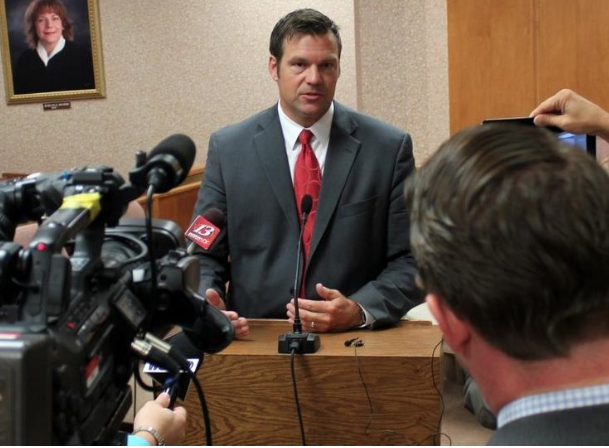
STEPHEN KORANDA / KPR
By STEPHEN KORANDA
Kansans who registered to vote at the DMV or otherwise used the federal voter registration form are eligible to vote in all races, according to court rulings, whether they’ve provided a citizenship document or not. But those voters might be confused by inconsistencies on Kansas Secretary of State Kris Kobach’s website.
As of Tuesday, the deadline to register to vote for the primary elections on Aug. 1, the website contained conflicting information on the Kansas proof-of-citizenship rule.
In accordance with a federal court order issued last October, some parts of the KSSOS.org site, and associated state websites, have been updated. The new language clarifies that voters using the federal registration form aren’t currently subject to the proof-of-citizenship rule and can vote in all races.
However, as of Tuesday, a frequently asked questions section of the secretary of state website still reads:
“If you are a new Kansas voter on and after January 1, 2013, include your U.S. citizenship document regardless of which application form you use… If you use the federal form and you do not provide a citizenship document, then you will be registered to vote only for federal offices and not for state and local elections.”
“FAQs are intended to be sources of quick information for voters,” says Mark Johnson, an attorney working on one of the lawsuits challenging Kansas voting rules. “This information is inaccurate. At best, it’s misleading.”
There’s been a lot of legal wrangling when it comes to the requirement that people registering to vote for the first time in Kansas prove their citizenship with a document such as a birth certificate or passport.
As it sits now, people who register with the state form are subject to the proof-of-citizenship requirement. But under court rulings currently in effect, people using the federal voter registration form, including thousands who registered at the DMV, aren’t subject to the rule.
When federal rulings said the state couldn’t impose the citizenship requirement on federal form registrants, Kobach instituted a dual-tiered voting system.
The guidelines said people using the federal form who had not provided proof-of-citizenship would only have their votes counted in federal races. That system was later knocked down by a judge in Shawnee County before the 2016 primaries.
Johnson says he believes the FAQ should be changed “immediately,” noting that it’s been almost a year since that Shawnee County ruling.
“When potential voters don’t understand whether they can vote or not, they tend not to show up. When there’s voter confusion, there’s voter suppression,” says Johnson.
Notices on receipts for voters registering at the DMV had the wrong information up through the registration deadline ahead of the general elections last November.
Kansas Public Radio contacted Kobach’s office about the persisting discrepancies Monday. Spokesperson Samantha Poetter initially said the office would respond to questions about the language on the site, but hadn’t by Tuesday afternoon.
Kobach pushed for the proof-of-citizenship requirements and has defended them as a way to prevent voter fraud.
“Every time a non-citizen votes in an election, not only does it potentially swing that election if it’s close, it cancels out the vote of a U.S. citizen,” Kobach said in an interview last year.
Critics of the Kansas voter registration policies have said voter fraud is rare and the rules are preventing eligible voters from casting ballots.
Kobach is now taking his efforts to the national level. He’s vice chair of the Presidential Advisory Commission on Election Integrity created by President Donald Trump to study improper registration and voter fraud. The panel has attracted criticism and lawsuits, some of that prompted by a request from Kobach that states turn over voter information.
Stephen Koranda is Statehouse reporter for Kansas Public Radio, a partner in the Kansas News Service.
